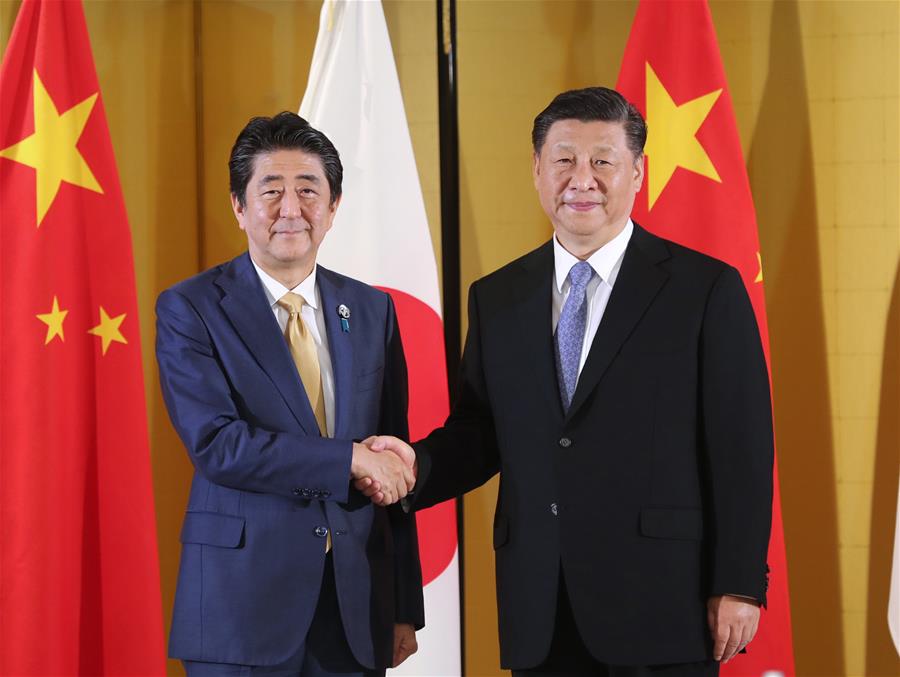Xi, Abe agree to build China-Japan relations in accordance with needs of new era

Chinese President Xi Jinping (R) meets with Japanese Prime Minister Shinzo Abe in Osaka, Japan, June 27, 2019. (Xinhua/Ju Peng)
Chinese President Xi Jinping and Japanese Prime Minister Shinzo Abe agreed here on Thursday that as both countries have entered a new era of development, joint efforts are needed to build bilateral relations that fit the needs of the new era.
Noting that the world today is undergoing profound changes unseen in a century with the global governance system being profoundly reshaped and the international landscape evolving at a faster pace, Xi said during a bilateral meeting with Abe ahead of a summit of the Group of 20 (G20) major economies that China and Japan share more and more common interests and concerns.
This year marks the 70th anniversary of the founding of the People's Republic of China and Japan has also entered the Era of Reiwa, Xi said, urging the two sides to make China-Japan relations an important and positive factor for maintaining world peace and promoting common development.
The two sides, Xi stressed, should always abide by the principles set forth in the four political documents between China and Japan, implement the political consensus that China and Japan are cooperative partners and not threats to each other, enhance mutual trust, and push forward China-Japan relations along the right track of peace, friendship and cooperation.
On the economic front, Xi urged the two countries to deepen cooperation in a wide range of areas, including trade, investment, third-party markets, and scientific and technological innovation, create new growth areas for cooperation, and actively lead regional economic integration.
China welcomes Japanese businesses to actively expand cooperation with China and share new opportunities brought by China's development, Xi said, noting that the joint development of the Belt and Road Initiative has opened up a vast space for mutually beneficial cooperation between China and Japan, and China welcomes Japan's active participation.
On people-to-people and cultural exchanges, the Chinese president said the two sides should strengthen their ties in this regard, enhance youth exchanges, and promote mutual understanding and amity between the two peoples.
Xi said he agrees to the launching of a high-level consultation mechanism on people-to-people and cultural exchanges between China and Japan within this year.
He called on the two sides to manage differences and disputes constructively through dialogue and consultation, strengthen diplomatic and security dialogue, and build a constructive bilateral security relationship.
Xi expressed hope that the Japanese side will abide by the consensus it has reached with China so far and honor the commitments it has made so far, properly handle history and other sensitive issues, and jointly safeguard peace and stability in the East China Sea.
China and Japan should, Xi said, strengthen communication, coordination and cooperation in international and regional affairs to jointly address global challenges and make global governance more just and reasonable.
The Chinese leader also said that China supports Japan in hosting the G20 Osaka summit, and anticipates that the summit will make a clear voice in upholding multilateralism and free trade to inject stable expectations and impetus into the world economic development.
For his part, Abe said he warmly welcomes President Xi to attend the G20 Osaka summit in Japan and is grateful for China's support for Japan's hosting of the summit, adding that Japan is willing to strengthen cooperation with China to push for positive outcomes of the summit.
Abe said he is pleased that Japan-China relations have returned to the track of normal development.
He said the Japanese side is willing to abide by the Japan-China Treaty of Peace and Friendship and other important political documents between the two countries, and continue to make joint efforts with China to build Japan-China relations that meet the requirements of the new era and ensure their long-term and stable development in line with the consensus of turning competition into coordination and being cooperative partners instead of threats to each other.
The two countries should maintain close high-level exchanges and dialogue, Abe said, noting that on behalf of the Japanese government, he would like to invite President Xi to pay a state visit to Japan next spring to take the bilateral relations to a higher level.
Japan, Abe said, hopes to expand bilateral cooperation in the fields of trade, investment, finance and innovation, and is willing to provide a fair, open, transparent and non-discriminatory market environment for businesses of the two sides.
The two sides should encourage friendly non-governmental exchanges, ensure the success of the ongoing China-Japan Youth Exchange Promotion Year and enhance the friendship between the two peoples, Abe said.
Japan, Abe said, stands ready to work with China to properly handle sensitive issues, and effectively manage disputes and differences in the East China Sea issues and other issues.
In the face of various problems and challenges regarding globalization, all countries should work together to tackle them, Abe said, noting that Japan attaches importance to China's important role, and looks forward to strengthening communication and cooperation with China to safeguard a free and fair trading system and assume greater responsibility for promoting world peace and stability.
The two leaders also exchanged views on the Korean Peninsula situation and other issues.
Abe said the Japanese side highly appreciates President Xi's recent visit to the Democratic People's Republic of Korea, and believes that the visit has played an important and constructive role in promoting peace and stability on the peninsula.
After the bilateral meeting, Abe hosted a welcome banquet for Xi.
The Chinese president arrived in Osaka on Thursday afternoon. He will attend the G20 summit on Friday and Saturday, and on the sidelines of the event, he will hold a series of multilateral and bilateral meetings with leaders of other countries.


